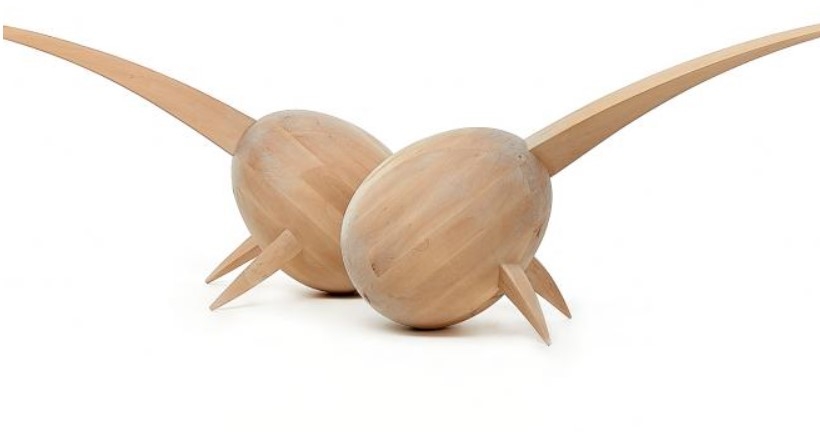Jānis Straupe’s solo exhibition No-objects sheds light on the recent history of Latvian design, giving visitors the opportunity to get to know one of the most unconventional creators, who already under the Soviet regime’s strict separation of styles strove to work in an interdisciplinary manner, demonstrating that wood sculpture, or wood as material, has the capacity to be surprising and contemporary. Jānis Straupe continues to work in experimental design and art, and with the new paradigm of sustainability has acquired particular relevance in today’s context.
“Throughout the process, from the idea to its realisation, I am in constant doubt regarding possible improvements. I have expressed my sensations in different, seemingly unrelated objects, and yet curiously they constitute a unified whole. In the exhibition of my latest works I wanted to create a somewhat skewed impression – like Alice in Wonderland, since every object also contains its opposite, giving it meaning. Everything is in constant flux and the state of peace is illusory,
says artist Jānis Straupe.
The contrasts and paradoxes characteristic to Jānis Straupe’s oeuvre are on display in this exhibition – for example, his work Self-isolation Chair (2019) is conceived as an ironic commentary – a fortress for the individual’s inner world. The large-scale sculpture Pendulum (2022) invites reflections on the fragility of the contemporary world, while Scorpion is a symbolic ladder that can also lead astray. The author used biographic references as well – for instance, he found inspiration for the work Ballerina (2021) while preparing models of Kārlis Johansons’ works at the Latvian National Museum of Art after its reconstruction, in its turn, the spherical object Eye (2020) includes a fragment from Straupe’s 1992 solo exhibition and symbolises an eye of his teacher, Jānis Poļaks.
“In his oeuvre, Jānis Straupe has been able to combine remarkable quality of craftsmanship with complexly innovative creative thinking, transforming the traditional material of wood, so popular in the practice of Latvian craft and design, in original, unpredictable ways. It could be said that the artist works on the boundary between sculpture and conceptual design. In the exhibition No-objects, visitors will not encounter any examples of functional design – its goal is to expand the horizons of imagination and thinking, to encourage looking at the world and things that surround us from a different perspective – critically, ironically and romantically”, stresses curator Inese Baranovska.
About the artist
Jānis Straupe (1962) entered the art scene in the mid-1980s – at a time when representatives of the so-called “applied” disciplines began to move away from usability and more towards reflection on the overarching tasks of “pure art”. The artist graduated from one of the most prestigious Latvian art schools of his day – the Woodcarving Department of the Riga School of Arts and Crafts (now Riga School of Design and Art). Having finished school, Jānis Straupe perfected his craft under the leadership of his teacher, the outstanding master-woodcarver Jānis Poļaks, at the combine Māksla, which carried out major commissions for the interiors of public buildings. Later he established his carpentry company (1998), yet, alongside functional design solutions and commissions, Jānis Straupe was always captivated by creative experiments and a conceptual form of expression.
While his early work, produced in the 1980s and 90s, shows the influence of postmodernism and references to the author’s beloved surrealism, over the years, Jānis Straupe has succeeded in throwing off the unnecessary literary layer. His mode of expression has become more laconic and precise in functional solutions as well as works of art, whose technical perfection and aesthetics have an affinity with the Latvians’ national northern mentality. Jānis Straupe’s compositions can be classified as unique design, which today justifiably is mostly included in the category of critical design.
Jānis Straupe has already held several impressive solo exhibitions at the Museum of Decorative Arts and Design (MDAD) (Jānis Straupe. Wood (1992), Insects (2004), Mesozoic Period (2008), Functional Frenzy (2013)) as well as taken part in several important thematic woodcarvers’ group exhibitions (Door, Bed, Closet, Table). The author’s work is represented in the collection of the MDAD and can be seen in the new permanent exhibition Design Process. In 2019, experts from the international Michelangelo Foundation included Jānis Straupe in the project Homo Faber. Since the beginnings of the initiative (2016), the designer maintains an active collaboration with the MAD International Design Summer School and its head, Rihards Funts, reads lectures and shares his experience, nurturing the young talents.
Jānis Straupe’s recent works are characterised by purity of form and dynamism – solid wood sculptures highlight materiality, yet at the same time strive to overcome gravity, create an illusion of lightness and grace (compositions Twisted Table (1992), Balance (Ballerina) (2021), Running Chairs (2021) and others). Jānis Straupe continues to experiment, keeps looking for new means of expression and makes use of complex technical solutions, also creating unique kinetic compositions (Pendulum (2022)).
Text by Inese Baranovska, Laura Brokāne




